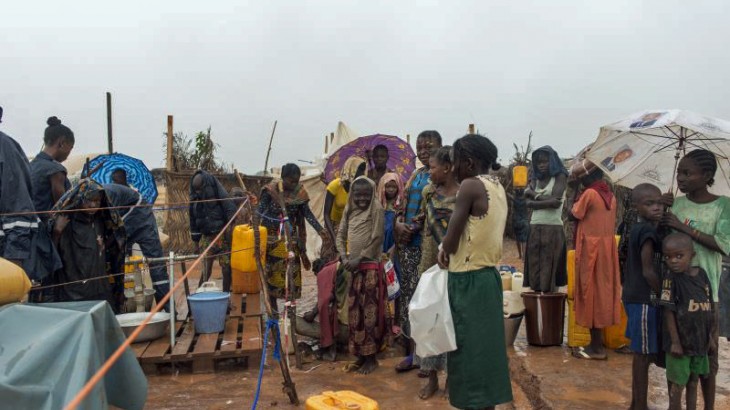Central African Republic: Don’t let crisis slip off international community’s agenda, ICRC regional chief appeals

(London) Rising criminality and the splintering of armed groups into smaller factions is worsening the already serious humanitarian situation in the Central African Republic (CAR), ICRC Head of Operations for Central and Southern Africa Patrick L'Hôte told an audience at the international affairs think tank Chatham House recently. Logistical and security challenges are limiting our capacity to help those most in need around the country, he said, including hundreds of thousands of displaced people.
Around 350 staff including 70 expatriates are employed by the ICRC to respond to the enormous humanitarian needs which have arisen out of the now nearly 2-year-old conflict in the country, among the poorest in the world. The ICRC’s operations in the country have expanded dramatically since the start of the conflict to become one of its largest in Africa in budgetary terms.
Logistical challenges posed by an absence of infrastructure, frequent roadblocks and a lack of security prevent our teams from reaching all those in need, attendees at the event hosted by Chatham House's Africa Programme were informed. Access to healthcare is a particular problem, as highlighted in a recent video dispatch by one of our delegates in Bangui. Sexual violence is also of grave concern.
People are desperate, warned Mr. L'Hôte, explaining that criminality has been on the rise in recent months as people struggle to survive.
Hundreds of thousands have fled violence to neighbouring countries or to makeshift camps inside the country. Large numbers of displaced people remain at a camp next to Bangui airport, because their homes have been destroyed or because they are too afraid to attempt the journey home.
Mr L'Hôte explained that the ICRC is working closely with the Central African Red Cross society to provide clean water for displaced people living in camps, transport the wounded and sick to health facilities, and collect dead bodies, among other activities. Health care, including surgery, is a major priority of the ICRC in CAR, where it provides staff and other support to hospitals and clinics as well as running a number of mobile clinics that provide care to people in hard-to-reach areas. Absent the backbone of a functioning health infrastructure, these services are essential for a struggling population.
Mr L'Hôte said representatives of governments, international organizations and NGOs must try to draw media attention to the humanitarian situation in CAR. We must prevent the crisis from slipping further down the international community's agenda, under pressure from the high number of simultaneously occurring crises globally, he said.
But there is no easy cure for the crisis, which has been compounded over recent months by competition over natural resources, warned Mr L'Hôte. Nor will the divisions left by the conflict be swiftly healed. For the ICRC, close collaboration with the volunteers of the CAR Red Cross Society will be key to ensuring a continuity of response, stressed Mr L'Hôte.
